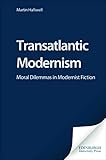Transatlantic Modernism : Moral Dilemmas in Modernist Fiction / Martin Halliwell.
Material type: TextPublisher: Edinburgh : Edinburgh University Press, [2022]Copyright date: ©2005Description: 1 online resource (272 p.)Content type:
TextPublisher: Edinburgh : Edinburgh University Press, [2022]Copyright date: ©2005Description: 1 online resource (272 p.)Content type: - 9780748623938
- 9781474497121
- online - DeGruyter
- Issued also in print.
| Item type | Current library | Call number | URL | Status | Notes | Barcode | |
|---|---|---|---|---|---|---|---|
 eBook
eBook
|
Biblioteca "Angelicum" Pont. Univ. S.Tommaso d'Aquino Nuvola online | online - DeGruyter (Browse shelf(Opens below)) | Online access | Not for loan (Accesso limitato) | Accesso per gli utenti autorizzati / Access for authorized users | (dgr)9781474497121 |
Browsing Biblioteca "Angelicum" Pont. Univ. S.Tommaso d'Aquino shelves, Shelving location: Nuvola online Close shelf browser (Hides shelf browser)

|

|

|

|

|

|

|
||
| online - DeGruyter Beyond New Age : Exploring Alternative Spirituality / | online - DeGruyter The History of Gothic Fiction / | online - DeGruyter Elizabeth Bowen : The Shadow Across the Page / | online - DeGruyter Transatlantic Modernism : Moral Dilemmas in Modernist Fiction / | online - DeGruyter Women's Writing of the Early Modern Period 1588-1688 : An Anthology / | online - DeGruyter Wood Quay : The Clash over Dublin's Viking Past / | online - DeGruyter The Crime Novel : A Deviant Genre / |
Frontmatter -- Contents -- Acknowledgements -- Introduction: Modernity and the Crisis of Morals -- Part I Naturalism and Decadence -- 1 Decadence, Naturalism and the Morality of Writing (Huysmans, Wilde, Norris, Wharton) -- 2 Books and Ruins: Abject Decadence in Gide and Mann -- Part II Symbolic Centres of Modernism -- 3 Extremist Modernism: The Avant- Garde and the Limits of Art (Tzara, Huelsenbeck, Breton, Aragon) -- 4 Moral Regeneration and Moral Bankruptcy: Conrad, Faulkner and Idiocy -- Part III Sexual and Cultural Difference -- 5 American Expatriate Fictions and the Ethics of Sexual Difference (Stein, Hemingway, Miller, Nin) -- 6 The Blind Impress of Modernity: Lorca, Kafka and New York -- Part IV Modernist Trickery -- 7 The Modernist Picaresque: Moralists without Qualities (Musil, Hesse, Hurston, Roth) -- 8 Myths of the Magician: Klaus Mann, Thomas Mann and Nazi Germany -- Conclusion: Liberating the Fear of Modernity -- Notes -- Bibliography -- Index
restricted access online access with authorization star
http://purl.org/coar/access_right/c_16ec
GBS_insertPreviewButtonPopup('ISBN:9780748623938);Transatlantic Modernism traces the intersection of artistic and moral ideas in European and American literary modernism. Rather than reading modernism as a complete rejection of social morality, this perceptive study shows how early twentieth-century writers such as Conrad, Faulkner, Gide, Kafka, Mann and Stein devised new aesthetic techniques to address ethical problems. By focusing on a range of decadent, naturalist, avant-garde and expatriate writers between the 1890s and 1940s, this book reassesses the moral trajectory of fiction on both sides of the Atlantic.The book is divided into four parts - Part I deals with Decadence and Naturalism, Part II with Symbolic Centres of Modernism, Part III with Sexual and Cultural Difference, and Part IV with Modernist Trickery - to discuss how modernist writers forged creative, but sometimes dangerous, links between personal and social morality. The chapters alternate between considering broad literary trends, such as the European avant-garde, American writers in Paris and the modernist picaresque, and the close study of influential texts, includingThe Immoralist, Death in Venice, The Secret Agent, The Sound and the Fury, Amerika and Mephisto. In response to the recent emergence of ethical theory in the humanities and the shifting parameters of national morality in the early twentieth-first century, Halliwell's book provides a fresh and timely analysis of the ways in which transatlantic modernists used fiction as a testing-ground for moral possibility. This new paperback edition contains an updated conclusion which explores modernist continuities in the early twenty-first century, literary responses to September 11 and the shifting parameters of national morality.Key FeaturesOffers a fresh look at American and European Modernism Discusses a wide range of important Modernist writers and texts including Wilde, Wharton, Conrad, Faulkner, Stein, Hemmingway, Kafka, Roth and Mann Explores the role of ethics in literature in new and innovative ways Introduces the historical and theoretical issues involved in ethical criticism using a broad range of examples"
Issued also in print.
Mode of access: Internet via World Wide Web.
In English.
Description based on online resource; title from PDF title page (publisher's Web site, viewed 02. Mrz 2022)


